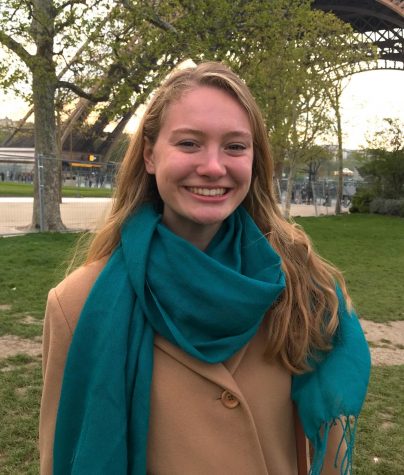News: A Year In “Review”
Editor’s note: This article appears as part of a series in which the Review’s graduating editors reflect on how their sections have evolved, the biggest stories of the year, and their time at the paper as a whole. The rest of this series can be found here.
From the impacts of COVID-19 on both the College and town, to student United Auto Workers activism, to the ongoing Gibson’s Bakery lawsuit, to the congressional race in our district, and more, Oberlin has seen an eventful year with plenty to report on. News Editor Katie Lucey, a College fourth-year and Economics major, was deeply involved in covering Oberlin’s important issues this year. Lucey has worked for the Review since her first year in multiple positions, from writer to Production Editor to Arts & Culture Editor to her role as News Editor this year.
The week that students were told they would need to leave campus due to the COVID-19 pandemic, Lucey co-wrote the story detailing the College’s decision alongside Editor-in-Chief and College fourth-year Nathan Carpenter (“COVID-19 Outbreak Continues, College Moves to Remote Campus,” March 13, 2019.) For Lucey, mourning the loss of her senior spring came along with a busy week of early morning meetings with College administrators and throwing a news story together at the last minute.
“I think it helped me process what was happening because in a lot of ways I had way more lead time into the situation than other students,” Lucey said. “I liked being so involved with it. In a way, I was not dealing with the emotions, but also dealing with it at the same time. … Surprisingly I found myself being very upbeat about the whole situation — looking back on it, I wish I had almost felt sadder.”
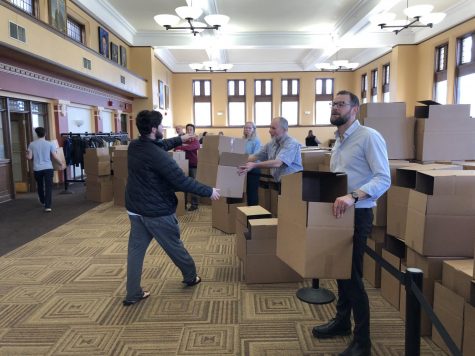
Pre-pandemic, an ongoing story of the year — and one of Lucey’s favorites to follow — was the coverage of the congressional race in Ohio’s 4th district. The Democratic primaries for the race included three candidates hoping to ultimately run against the far-right incumbent Jim Jordan, founder of the House Freedom Caucus. Senior Staff Writer and College second-year Ella Moxley wrote stories about these three Democratic candidates who remained hopeful despite running in a notoriously gerrymandered district (“Democratic Candidates Look to Defeat Rep. Jordan in 4th Congressional District,” Nov. 15, 2019.)
“I love any opportunity that we can cover not only what’s happening in Oberlin, but what’s happening in the broader Northeast Ohio area,” Lucey said. “Ella did a really good job of actually going in and interviewing real candidates and putting that all together into a few really great stories.”The race also included independent candidate Chris Gibbs, who is a farmer and former Trump voter who became frustrated with the current administration’s trade war policies (“Independent Congressional Candidate Visits Oberlin on Listening Tour,” Dec. 13, 2019.) Some Democrats are hopeful that Gibbs will split the vote come the general election, and make a Democratic victory against Jordan more likely. Ultimately, candidate Shannon Freshour won the Democratic primary and will face Jordan and Gibbs in November (“Freshour Wins Democratic Primary for 4th Congressional District,” May 2, 2020.)
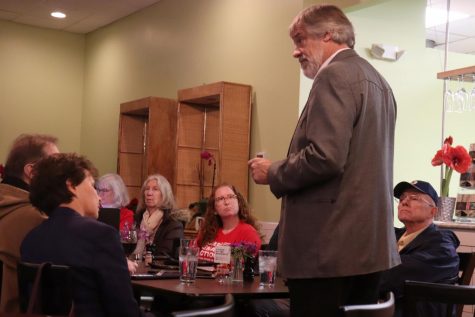
This year also saw a continuation of the College’s efforts to create a more sustainable and balanced budget. Many recommendations made in the One Oberlin report by the Academic and Administrative Program Review were implemented. But the process also increased tensions between the Oberlin Student Cooperative Association and the College. Lucey wrote a story in February relating to OSCA’s concerns about the AAPR recommendations (“Halted Survey Sparks OSCA Concerns,” Feb 14, 2020.)
College third-year and OSCA Membership Secretary Bhairavi Mehra received summer funding through the Environmental Studies department to develop a survey meant to gauge Oberlin student and alumni preferences on housing and dining and assess the value of OSCA in student life.
“For whatever reason, that survey was halted and not sent out,” Lucey said. “The reason stated by the College was that they had already received that information through other data sources. But some people felt that that was a huge lack of transparency on the College’s part and potentially a tale of what was to come between OSCA and the College’s rent negotiations going forward because people felt that OSCA’s voice was not being heard or valued and they were afraid that it could be in an adverse negotiating position with the school.”
Another organization impacted by the College’s financial plans was Oberlin’s chapter of UAW. In February, the College announced that it was considering outsourcing work to provide campus custodial and dining services, which could put more than 100 unionized employees’ jobs in jeopardy. Soon after the College emailed students that they were considering this possibility, students organized a demonstration in King Building to show support for UAW workers and push against what many considered to be union-busting. Carpenter wrote a story about the College’s announcement and the student response (“College “Considering” Outsourcing Dining, Custodial Services,” Feb. 21, 2020.) For Lucey, being a part of the team that covered this news allowed for her to have a special perspective on the controversy.
“It was fascinating to me how every time we were like, ‘Oh, there’s nothing happening this week. This is a slow news week,’ that would be the week that like all hell would break loose and we had to hustle to write a story,” Lucey said. “It was really cool to see Oberlin students rally behind the UAW workers. I used to find myself pretty reticent to get involved with politics. But I went to the rallies there, I went to the protest in King, I tried to get involved with it. So I think that was a moment of growth for me.”
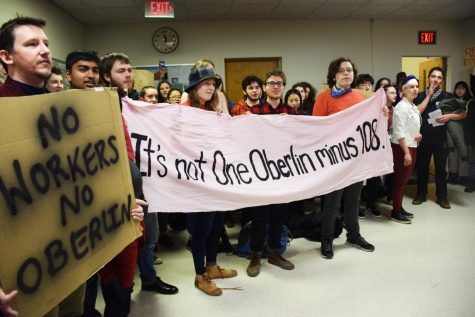
Other important events of the year, like the student-run Climate Strike in September (“Campus Activists Participate in Worldwide Climate Strike,” Sept. 27, 2019) or the College appealing the Gibson’s Bakery verdict in October (“Gibson’s Verdict Appeal Filed,” Oct. 11, 2019,) can feel far away considering the sheer amount of news that has come through Oberlin in the past two semesters.
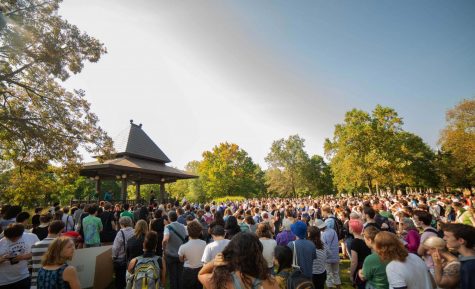
“We had a lot to report on this year, and it kept us busy,” Lucey said.
For Lucey, some of the most meaningful stories of the year were not always the ones on the front page.
“I think there are a couple of really cool and interesting feature stories that we did that [showcase] people [who] don’t often get attention,” she said.
Among these was Lucey’s piece about heroin overdoses within Oberlin city limits and how the Oberlin Police Department was responding (“Local Overdoses Raise Concerns,” Sept. 6, 2019.) Additionally, the story looks at how heroin overdose incidents in Lorain County compare to the rest of Ohio and have changed over time.
“It was just one of those like instances where we’re not just reacting to the immediacy of what’s happening on campus, but we’re kind of going deeper into the community and writing about what’s happening there,” Lucey said.
For Lucey, who’s been involved with the Review for almost four years, being a student journalist and being a part of the Review’s community has been deeply impactful; a lens through which to view much of her college experience.
“Sometimes I think about how the cast of characters has changed over the years,” Lucey said. “At some point I had to embrace that. Like at this point I’ve worked with eight years of students: people that were seniors when I was a [first-year] and then people that are [first-years] now that I’m a senior. That’s a pretty broad range of people. I think what makes it even cooler is this huge group of people was really interested in the same thing that I was.”
